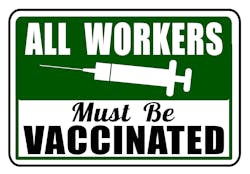By Karen Hanna
With a looming vaccination deadline for businesses with 100 or more employees, some executives at plastics processing plants say they’re not eager to push their employees to get shots that have proved unpopular among a sizable sector of the population.
According to federal rules released Nov. 4, large companies must ensure that their workers are either fully vaccinated against COVID-19 by Jan. 4 or that they test negative for COVID-19 at least once a week. Lawyers and attorneys general in at least two dozen states so far have raised objections to the mandate.
Maureen Steinwall, CEO/CFO of Steinwall Inc., a Minneapolis-area injection molding shop that currently employs about 155 people, said debate over the mandate boils down to “individual choice vs. Big Brother knowing [what’s] best for you.” To her, issuing a vaccine mandate, to be enforced by the Occupational Safety and Health Administration (OSHA), is creative but unreasonable.
At a time when employers are facing unprecedented challenges staffing their businesses, Steinwall said her company has already been hurt by other mandates — it lost one mold maker on the day Minnesota began enforcing mask rules early in the pandemic.
“He wanted nothing to do with the government telling him what to do,” she said.
Scientific trials have shown the vaccines are safe and effective in helping to prevent COVID-19, which has so far taken the lives of more than 750,000 Americans.
While she described herself as a vaccine proponent, Lori Schaefer-Weaton, president of Agri-Industrial Plastics, which has 200-plus employees, shared some of Steinwall’s concerns.
“If somebody has a strong feeling about not being vaccinated in this [labor] market, they’re going to leave and they’re going to go across the street, so I’m very concerned about that,” Schaefer-Weaton said in an interview in October.
She’s also worried that the testing option — which the government announced employers won’t have to pay for — could present its own set of challenges.
“I’m concerned, on the other hand, at least in our area, just managing COVID cases and contact tracing, testing supplies have been an issue,” Schaefer-Weaton said.
The Fairfield, Iowa, custom blow molder, which she said has lost a significant amount of productivity and a “ton of hours due to COVID,” offers workers $200 to get vaccinated.
Curtis Dubay, a senior economist for the U.S. Chamber of Commerce, which has published some preliminary guidance on the mandate, said he’s unsure how the rule might affect staffing levels.
“Watching that closely, but don’t have a way to quantify ... it at the moment,” he said.
OSHA has held open the possibility that the mandate could be expanded beyond large companies.
“OSHA is confident that employers with 100 or more employees have the administrative capacity to implement the standard’s requirements promptly, but is less confident that smaller employers can do so without undue disruption,” OSHA states in a summary of the rule. “OSHA needs additional time to assess the capacity of smaller employers, and is seeking comment to help the agency make that determination.”
With only about 60 workers, Atlanta-area molder Elevate Solutions Group isn’t subject to the mandate. But that hasn’t stopped co-owner Michael Sinclair from encouraging people to get the shot.
“I don’t want anybody to get sick and die, but I also don’t want to shut down, so I have two motives,” he said.
In informal discussions with employees about the vaccine, he discovered that many simply hadn’t made time for it. Once the company started offering $50 bonuses to workers to get the shot, 30 people rolled up their sleeves.
“I was thrilled because I was just fearful of an outbreak here,” Sinclair said.
About the Author
Karen Hanna
Senior Staff Reporter
Senior Staff Reporter Karen Hanna covers injection molding, molds and tooling, processors, workforce and other topics, and writes features including In Other Words and Problem Solved for Plastics Machinery & Manufacturing, Plastics Recycling and The Journal of Blow Molding. She has more than 15 years of experience in daily and magazine journalism.


